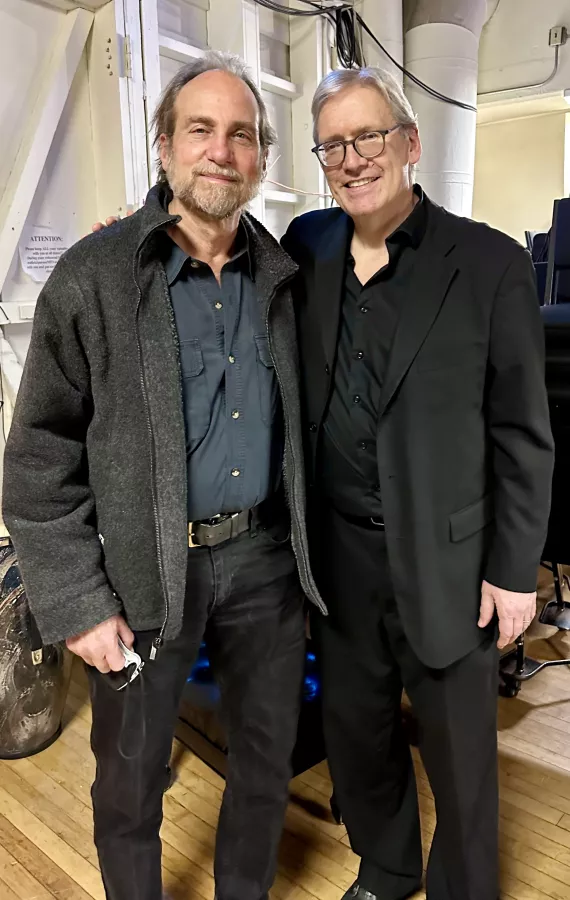'Bird Rock' at the New England Conservatory

Gerald Levinson and Ken Schaphorst backstage after the NEC Concert
Last December, the New England Conservatory (NEC) celebrated the 50th anniversary of their Third Stream Department. Originally founded by Gunther Schuller and Ran Blake, the department was named after Schuller’s term for describing the fusion of jazz and classical music. More recently the department has been renamed Contemporary Musical Arts to reflect their extension into all music that involves improvisation, not just “classical” jazz. In honor of their 50th anniversary, the department held a special performance entitled “Crossing Boundaries” that featured their jazz ensemble to highlight the intersection of jazz, improvisational, and classical music. The program featured works from numerous composers that fit this theme, including Duke Ellington, Morton Gould, and department cofounder Ran Blake. There was one composer featured that should be particularly familiar to the Swarthmore Community: Gerald Levinson.
Gerald Levinson is a renowned composer and musician. He has been awarded the Music Award (for lifetime achievement) of the American Academy of Arts and Letters. As a child, Levinson would listen to artists like The Beatles and try to improvise on piano over their songs. He says, “I came to make up my own recorded, not-quite compositions, superimposing music from the radio on my own improvised sounds including some produced by strumming or striking the strings inside the piano.” Levinson began his undergraduate studies at the University of Pennsylvania, where “three of the most renowned and exciting composers in the US were on the faculty.” These three were George Crumb, George Rochberg, and Richard Wernick.
Levinson went on to study music at the University of Chicago with Ralph Shapey and at the Paris Conservatory with Olivier Messiaen, with whom he would occasionally work as translator and assistant. His music has been widely commissioned and performed in the US and Europe by major orchestras and ensembles, including the Los Angeles Philharmonic and the Philadelphia Orchestra. Distinguished conductors such as Sir Simon Rattle, Christoph Eschenbach, Gunther Schuller, David Zinman, and Hugh Wolff (now the director of conducting studies at NEC), have performed pieces written by Levinson. Much of his music is available on recordings, most recently a double album anthology of works large and small from 1972 to 2015. He is now the Jane Lang Professor of Music at Swarthmore College and has served three times as department chair.
In 2014, Levinson experimented with a genre in which he had little experience: jazz. He had this to say about this musical excursion: “The piece was written ‘on spec’ you might say, because my music has otherwise found its home in other genres and venues than jazz and it was in fact first tried out by the Swarthmore Jazz ensemble directed by Drew Shanefield.” This piece would be called Bird Rock, named after the neighborhood in San Diego, California where he wrote it. He particularly liked this name because it came “ready-made, combining two musical words including the reference to Charlie ‘Bird’ Parker and suggesting something of the hard-driving nature of the piece.” He goes on to say, “this is not and doesn’t pretend to be jazz, per se, but it’s music intended for jazz players and couldn’t have been written without the experience of jazz.” Here lies the reason Bird Rock was featured at NEC’s Contemporary Musical Arts 50th anniversary concert, on the theme of “Crossing Boundaries.” Its blending of genres places it at the intersection of classical and jazz music.
When asked what challenges he faced when composing Bird Rock, Levinson said, “the novelty for me was writing for a medium in which traditionally not everything is written out.” This is a clear departure from classical composition where the written notation will tell the performer almost everything they need to know about playing it. Some instrumental parts (mainly the drums) are largely improvised throughout the piece, and the entire extended middle section is a semi-controlled improvisation by the whole ensemble, inspired partly by the glorious chaos in works by jazz composer and bassist Charles Mingus. “We even made major changes at the last rehearsal involving improvisation, especially adding a new final burst of total anarchic collective improvisation, a mass cadenza, at the very end. Only jazz musicians could respond to this degree of flexibility . . . The whole concert was long, varied, and tremendously demanding, full of terrific and powerful music, one of the more thrilling concerts I’ve ever been part of.”
Bird Rock was played on December 8th at the New England Conservatory where the ensemble put on an excellent performance of a unique composition. The piece provided an interesting challenge for Levinson as he broadened his musical horizon in composition all while fitting in perfectly with the theme of the concert repertoire. The entire 50th anniversary concert can be viewed here. Bird Rock can be heard at the 32:34 mark. You can view and download the concert program here.



